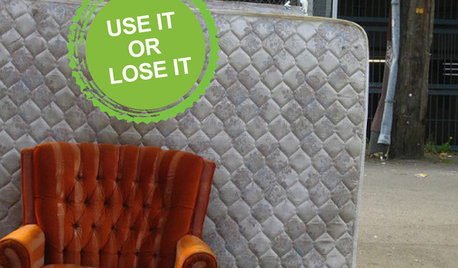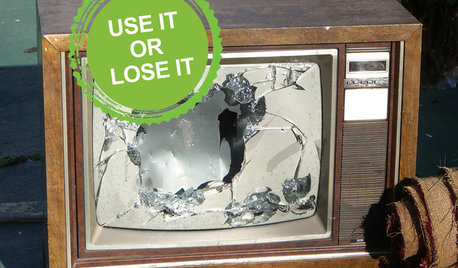getting rid of bees
How do I get rid of bees which are living under my siding of my house? I tried to get a bee keeper to come and get them but no one was interested, said to kill them. I tried to spray up under the siding where they go in with wasp and hornet spray (It claimed it would work on bees). I did this in the evening. After I sprayed a small committe came out to look around.
"Susie did you forget to use your underleg deoderant?"
"It's not me, I think it's Joyce."
"Don't blame me! It must be Mabel."
etc.
I did this three days running, and it does not seem to bother them at all. My husband said maybe I could freeze them out with a fire extinguisher. I must get rid of them because I am getting new siding and the siding man is allergic to bees. Please help!
Comments (95)
Shari_AZ
19 years agolast modified: 9 years agoVery concerned about lots of bees I'm seeing out a b/r window. They are either in a tree or right on the house from what I can see. They have been there for weeks. ( after a good storm it seemed there were tons of them in view of the dripping rainwater when peeking out of the window). At this point I am not sure of the exact location as I'm very nervous about getting near due to possible allergies and am ill at this time. Wonder if there is anyone in the 480 area code (Tempe) area that might have some insight about who to call to check it out.
Anyone with any suggestions and insight let me know.
Since I'm in a warm climate will the bees be around all year or do they leave in the Fall like in other locations.Thank you anyone that might answer
Shari in Az.
ccrb1
19 years agolast modified: 9 years agoYou probably only need to post this message once. Suggest you contact your county extension office.
Related Professionals
Fitchburg Landscape Architects & Landscape Designers · Graham Landscape Architects & Landscape Designers · Sahuarita Landscape Architects & Landscape Designers · Bethlehem Landscape Contractors · Stoughton Landscape Contractors · Williamsburg Landscape Contractors · Wilmington Landscape Contractors · Indianapolis Landscape Contractors · Lemoore Landscape Contractors · National City Landscape Contractors · New Berlin Landscape Contractors · Point Pleasant Landscape Contractors · Ridgewood Landscape Contractors · Ringwood Landscape Contractors · Sammamish Landscape Contractorsmaddalfred
19 years agolast modified: 9 years agoSomeone else already said it. Depressing thread. Having been raised in the country, I have never understood the first response that most people have to insects and other creatures they see is how to kill it. I had a hive of honeybees given to me as a gift from my father when I was a teen and I thoroughly enjoyed them, after I left home my father kept up with the hive until he no longer could. I never wore protective clothing when I dealt with my hive, they knew who I was and seldom stung me, and when they did it was my fault, not theirs.
Bees and other insects and animals can smell the subtle difference of pheremones in the sweat of humans and only usually attack for sure when they smell the pheremone released in the sweat when one is fearful/angry.
I currently have a neighbor down the block with the same "problem". Honeybees in his wall. The sad part is, had I not told him and his girlfriend, they would probably have remained blissfully ignorant. After I did tell him, he decided to do exactly what these other people are doing and suggesting. If they built in MY wall, I would take out enough sheetrock to install a glass window and enjoy the hell out of them. Go figure.
bh_racing
17 years agolast modified: 9 years agoHi...I have smaller versions of carpenter bees (fuzzy yellow and black)that live under my house. I work in my yard alot and I get frequent hovering fly-bys (I know they're only curious about me). Since I AM ALLERGIC to bee stings and I don't want to kill them, is there something I can do to persuade tham to move away?
bandit_tx
17 years agolast modified: 9 years agoIf you are truly allergic I assume you are never more than 10 feet from an Epipen? Most people that claim to be allergic have no idea what that really means. People that are really allergic carry Epi's everywhere because a sting will kill them in minutes. There is very little anyone in Texas can do to prevent being exposed to stinging insects including bumble bee, honey bees, red wasps, yellow jackets, hornets, and fire ants. Most people that are truly allergic would be cautious about yard work for that reason.
vscheider_yahoo_com
16 years agolast modified: 9 years agoI live in KY and I have carpenter bees in both sides of my house, my house is old and they have been there for a long time. They are starting to get aggressive when we go out the door they dive bomb our heads now, and I have 5 kids even though we haven't gotten stung yet I know it's just a matter of time before we do. I don't have the money right now to have someone come remove them and I've used the sprays in the past and they didn't work. This string of responses have me confused with everyone going back and forth. I need to know what I can do on my own that won't cost much of anything. Any help would be VERY much appreciated.
Thanks,
Virginiatxbeeguy
16 years agolast modified: 9 years agoVirginia,
See the 'Control' section of this write-up:http://www.ca.uky.edu/entomology/entfacts/ef611.asp
Best of luck.
Here is a link that might be useful: Carpenter bee control from UK
eibren
16 years agolast modified: 9 years agoWhen wasps were making little starter nests in openings in my RV, I bought some wasp repellant and sprayed it in the holes periodically. They decided to go elsewhere, so it worked without killing them.
I noticed, though, that while the wasps were around there were no flies.
jw80134
16 years agolast modified: 9 years agoThe cheapest way to kill bees---> $1.19 a pack of fly catcher kill 300 bees
After I spend about $50 with all kind sprays and bee catcher things and I spend every weekend worked hard seal their homes, the bees keep comming back and making new homes under my desk inside the brick post. I decide to try something new-- fly catcher! It really worked! a package of 4 sticky fly catcher cost $1.19 from Home Depot (or $1.98 from Lows) I hanging them near bee nest. before I finish hanging the catch strips, it already catch 30 of them in a minute! I have a big bucket of water under it. to catch them when they drop down. I can see bees like rain drop down to the bucket. one day killed about 300 of them. I changed 4 strips next day, keep catching rest of them. Of course this cannot totally get rid of them, but who cares about left 3 smart bees still alive. BTW, I used put lot clothing on and cover my face when the first day working on killing bees, but I found out they don't bother me at all. I do feel guilty killing them. However, if someone comes to my property without ask me, I have right to kill him, right? same to bees, I still don't know what kind bees I killed, sorry.
kdel
16 years agolast modified: 9 years agoI too have a problem with ground bees. We just moved into a home and the cement in front of our garage door has some cracks in it and there are bees living in the cracks. How do I get rid of the honey comb if they are under cement?
We cannot offord to dig up the driveway:)backyardmama
16 years agolast modified: 9 years agoTo get rid of bumble bees or any other bee living in the ground spray/pour orange oil into the entry/exit holes. We had a large swarm near the driveway several years ago and 1 half gallon bottle from the garden center was all that was needed. It is an evironmentally safe product.
dangar7
16 years agolast modified: 9 years agoRecently I was showing my father my perennial and shrub garden, it was about 7:30 pm. I walked around one shrub, when all of a sudden I felt intense pain on my arm and legs. There were yellow jackets/hornets on me and my clothes. I slapped them off and went into the house. There were three more bees in my clothes, one stung my chest. The following day at dusk I sprayed the nest with a can of wasp/hornet spray. The next day I put two bricks on top of the hole where the bees made a nest into the ground. Is there anything else I should do? i am scared after reading the other notations that the bees may come back and make a new nest next year.
greta73
16 years agolast modified: 9 years agoyellowjackets are showing up at my picturewindow inside for the last five days cannot find out where they are coming from ther are no more than three or four a day so far and they seem to be young ones
rosie_2006
16 years agolast modified: 9 years agoI've been feeding the honeybees. I had a couple of hummingbird feeders, one of which was cracked near the bottom. One late afternoon day I went out to sit on the deck,I discovered the broken feeder covered with honeybees. I was so enthralled watching them. They emptied the full feeder in 2 days. Am I asking for trouble? I don't know where they came from. I live in a development, but my house backs up to forest. I would like to continue feeding them but from a safer distance than on my deck. Should I move the feeder to the woods in the evening? Will they be able to find it? I thought there was a severe decline in the number of honeybees, and I don't want to kill them.
tonybeeguy
16 years agolast modified: 9 years agodangar, try doing a google search on yellow jackets. I'm not sure if they make use of an existing cavity in the ground or start from scratch. I had the same situation in a yard where I was doing work. I flooded the hole with a hose, then filled in with some dirt. It's bee three years and there haven't been any more in that location.
Rosie, It should be okay to feed the bees. Some beekeepers place a bucket of sugar syrup in a bee yard and put some straw on top so the bees have something to land on and don't fall in and drown. The only thing I might wonder about depending on where you live is being visited by a bear.markb1
16 years agolast modified: 9 years agoHello
Newbie here. Located in southern oregon on 12 acres mostly irrigated pasture.I have honey bees in the wall of a shed that I would like to relocate. They are about four feet off the ground. I could remove three or four boards to expose the hive.
I would like to keep this hive on the property. Can someone provide detailed step by step instructions for relocating this hive? With materials and supplys needed.
Thanks Mark
tonybeeguy
16 years agolast modified: 9 years agoMark,This is going to be long. First off you'll have your work cut out for you(pun accidently intended) What you would be doing is called a "cutout" Have you ever had bees before? I think that my main concern at this time is that we are going into september, so it's kind of borderline to put some bees in a hive. You can ask other opinions, but I think it might be better to let them overwinter and if they survive, remove them in the spring. It may be best to have someone experienced do the job and ask if you can assist them. It's one thing watching honey bees going in and out of a hole. It's another thing to have several thousand bees buzzing around trying to find an opening in your suit and head butting your veil, and trying and sometimes succeeding in stinging through your gloves and clothing. It may not be the best first experience with bees. I know from being 20 ft up on a ladder that you have to keep your cool no matter what happens.Either way, here is some basic stuff you'd need and an idea of how to do it. First of all, You'll need a place to put them. Depending on the size of the hive, which has some relation to how long they've been there, this may be a full 10 frame hive body or it could be a five frame "nuc" which is just a smaller box to put bees in. Besides any carpentry tools, You will need some wooden frames that are empty, and possibly some with "foundation" You'll need string,rubber bands, and a long bladed knife. You will need a veil, a smoker and smoker fuel (which can be sawdust), and protective clothing, loose fitting light colored or white pants (I wear painters pants)shirt and gloves. A "bee-vac" is also one of the handiest tools to have for a cutout, although it's not absolutely necessary. A helper comes in very handy when it comes to tying in comb.First off, try to determine how big the nest is and where entrances are. Have your smoker going good, suit up. You can use rubber bands around you cuffs to keep the bees from crawling up your pants legs. Smoke the entrances. On the last cutout we did the bees were very calm and we only smoked them once at the start. We used hammers, pry bars and power saws and the bees never got upset.Every situation is different,though. Do the necessary cutting prying etc to expose the nest. Here's where a bee vac is handy. You vacuum the bees off the comb. Without the vacuum, you'll cut sections of comb and tie them into the wooden frames using string or rubber bands. You'll want to keep the combs in the same order as they are in the wall. The largest concentration of bees will probably be on frames with varying stages of brood. Bees will not leave the brood, because they need to be kept warm and fed. If you get the queen into the hive you should be set as far as getting the others to follow. This is a very brief and simplified explanation of what to do. You'll be trying to hold up fairly heavy and delicate sections of honeycomb with out squeezing any bees or doing damage while you cut the comb at the top so you can remove it. It will be sticky and slippery at the same time. Bees will be flying all over, and you'll have to carefully place the comb in the frames and hold it in place while you tie it in. I'm not saying all this to discourage you, but to let you know that it's not a breeze and once you start, you're pretty much committed to finish. For a newbee, installing a 3 lb package of bees into a newly set up hive is considered an accomplishment to be proud of and can be a little nerve racking. You usually spend quite a while getting used to working the bees and learning the ropes before attempting a cutout. Check on line and you may find someone with a video of doing a cutout. Retrieving a swarm is something totally different and "usually"(with a grain of salt) much easier. If you do wait until spring, you'll have the whole winter to get equipment, read some good books and maybe find a mentor. Either way, come january, you should order a package of bees. It's good to have two hives for comparison, and if the wild ones don't make it, you can still get started in beekeeping. Good luck. It's a very interesting, exciting, and rewarding hobby.
markb1
16 years agolast modified: 9 years agoTony
Thanks for all the info and advice. I think I will wait till spring as you sugjest for all the reasons you mentioned. I hate doing things in a rush and unprepared. Spoils all the fun. They have been in the wall for three or four years and last year was a cold one for our area (if that makes a difference) so hopefully they will survive.
We were going to have a bee man remove them but at the last minute he said it would be $100.00 Not that that is unreasonable from what I,ve read. We just don't have the money right now.
I've always been interested in bees, just never made the time to pursue it ,so nows my chance, and with your help and other bee keepers I'm sure I have a good chance of success.Thanks Mark
tonybeeguy
16 years agolast modified: 9 years agoMark, I think that's the best decision. That will give you time to read a few good bee books. Order some catalogs too. You can learn a lot from them and get an idea of the equipment and terminology. Make friends with a local beekeeper or two and join a club if there is one in your area. good luck
targis55_hotmail_com
16 years agolast modified: 9 years agoI also have bees in my chimney. They look like honey bees and I wasn't really concerned till I had to put a new liner in. I can't get near the chimney. I had the hive move in a few years back and then 2 hives split off which were recovered by a beekeeper. He wouldn't touch the chimney and I can't blame him. Its 30' up there. I have searched for the hive and brood but can't see it. We are going to look again this weekend when I have some supplies ( like a BIG net over me) I need to find the entry hole so I'll have to go look during the day. I'm not sure SEVIN is legal in Canada (correct me if I'm wrong) but I would like to have the hive robbed if possible. Once the new liner is in I can fill the chimney with cement effectively sealing the old part of the chimney for good. I read about soap and water to kill the bees. Maybe someone could expand on this a bit. Also would I have to have eyes on the hive for this to work?? Time is a problem. The liner needs to be in place before I can get more oil for my furnace. Ripping apart the brick really isn't an option at this time.
One more bit of info. I had known about the bees for some time. I had been watching them. I had another small nest at another location that we were going to lock out this spring. Both Hives appeared to be dead in the spring. No bees were visible for most of the summer. Is it possible that the hive in the chimney is simply being robbed and not the original hive.
More info. While writing this I went outside to see if I could see the enty hole. Place the ladder up to the roof and after about 2-3 minutes they started swarming from the chimney. There are lots!!
Miketonybeeguy
16 years agolast modified: 9 years ago"I also have bees in my chimney. They look like honey bees and I wasn't really concerned till I had to put a new liner in. I can't get near the chimney."
We got a call for bees in a soffit next to a chimney. We cut out part of the soffit and there was actually a very big space that went all of the way behind the chimney that was full of comb and honey. For the most part they didn't bother me the whole time I was cutting out the comb. I used a bee vac to get most of the bees out. The tough part was being 25 ft up on a ladder. You can't panic or run away. I had a helper and wore a safety harness. I don't know if all chimneys have a big space behind them as a fire safety thing or not. If so, there's a good chance that that's where your bees are. You may need to get someone to come and take care of it. You really need to get the space cleaned out well or it will attract ants once the bees are gone and more bees eventually."I have searched for the hive and brood but can't see it. We are going to look again this weekend when I have some supplies ( like a BIG net over me) I need to find the entry hole so I'll have to go look during the day."
Binoculars work good at a safe distance.If there is a bee supply house within driving distance it will be well worth the money to by a veil. You can get what's called an Alexander veil for around $15. Covering yourself with a net will probably not keep the bees out. If they get angry, they are very good at finding openings in your protection and can sting through tight fitting clothes. That means loose fitting pants and shirt, fairly heavy gloves, and rubber bands around your cuffs, and a veil.
"I'm not sure SEVIN is legal in Canada (correct me if I'm wrong) but I would like to have the hive robbed if possible. Once the new liner is in I can fill the chimney with cement effectively sealing the old part of the chimney for good.If you use a poison and bees rob the hive they may bring it back to their hive and you could end up killing some one's hive which is not acceptable. also As I mentioned, you really need to get the honey out.
"I read about soap and water to kill the bees. Maybe someone could expand on this a bit. Also would I have to have eyes on the hive for this to work??"
Soapy water will kill them fairly quickly, but you need to have access to the comb, brood etc.
"Both Hives appeared to be dead in the spring. No bees were visible for most of the summer. Is it possible that the hive in the chimney is simply being robbed and not the original hive."
It seems like if it was bees robbing, they would have found the hive a long time ago
"More info. While writing this I went outside to see if I could see the entry hole. Place the ladder up to the roof and after about 2-3 minutes they started swarming from the chimney. There are lots!!"
Are they actually flying out of the chimney top? Check during the day with binoculars to find the actual entrance, then ask yourself "Am I afraid of hundreds or thousands of bees buzzing around my head. Some hives are more temperamental than others. Do I want to risk doing it 30 ft up on a ladder, or should I spend some money to have an experienced person do the job." We don't want anyone getting hurt or worse
Mikecoug51eh
16 years agolast modified: 9 years agoHi!!! I really really need some help. So, I am trying to plant my sale hydrangea bushes, and all of a sudden I am surrounded by black and yellow fuzzy bumblebees. They dive bombed me from above, and flew up out of the ground. Nevertheless, I stood my ground. Not one bee bit me!!! But, at least 50 bees surrounded me, stared at me, and if they could talk, probably swore at me. What do I do?? Will they leave?? My hydrangea bushes could be planted later in the fall, but what will happen to the bees?? I tried to understand a "virgin queen" vs. the old queen, and the length of time these bumblebees live in the ground---I just need some imput as to what to do. I do not wish to kill them, though I really would like to plant my 5 hydrangea bushes. The ideal situation would be to plant the bushes and let the bumblebees exist there as well. This bed is next to my neighbor's house, and he is a mean old crochety guy!!! As far as I am concerned, let their hive continue---and may the bees frustrations be stinging my neighbor!!! LOL Please help me!! I know bee pollenation is low in Pittsburgh, PA. And, I do know how important bumblebees are in our environment. Thank you all!!!
linderlou
16 years agolast modified: 9 years agoI just want to know how to keep bees away from an outdoor party where we will be serving root beer. Some sort of a way to divert them and keep them out of the yard. We have not noticed any bees this year, but do not feel we can take a chance.
bcharlt1_twcny_rr_com
16 years agolast modified: 9 years agoLooks like I have a problem similar to (and yet, different than) most of the ones described here.
My girlfriend and I live in an apartment that's attached to the house next door. In our backyards (both us and the neighbor, we share a large L shaped yard) we constantly have problems with hornets. We get a mixture of wasps and bumble bees as well, but it's typically hornets here.
We see small (maybe 4" x 5") honeycombs being built on the house, we spray it at night, they all die, we remove it, etc ... but they keep coming back. There's one at the peek of the back of the house that's "dead" from a couple years ago, but other than that, every last honeycomb is removed when the bees are. And yet, we can't win.
The worst year we've had so far was last summer (07), and we noticed that there were several bees most of the time floating around my neighbor's garage (the back of her garage faces our yard). So I think it might be possible that she has bigger nests/swarms than we do, and just hasn't dealt with it.
So I'm wondering ...
1. Is there a way to basically make our yard less attractive to bees?
2. Is there a law that says my neighbor HAS to take care of their bee infestation (IF they have one, and are neglecting it)?I just don't want to go through a bunch of pains and a bunch of money to fix something every year when it wouldn't be as big a problem if my lazy neighbor would deal with a little responsibility.
Oh and for question 2, it's important to know that we live in New York, as I'm sure any laws like that are probably state-specific.
Any help is GREATLY appreciated, folks.
bloodguzzler
15 years agolast modified: 9 years agoI live in Miami Florida; I have a friend who is having a bee problem herself. Unfortunately, she is also on a very tight budget. I read somewhere that beekeepers will sometimes take the bees for free. If this is true, please give me some names as soon as possible. It will be a tremendous help! Thank you!
julysun
15 years agolast modified: 9 years agoRemoving feral bees is best done by a beekeeper and even he will be lucky to find the queen and save the bees. In walls, chimneys and other tight and closed spaces it is tough. Sadly many have to be killed and, the nest needs to be removed or it will finally begin to drip as it rots, (50,000 bees will make a real stink) and, possibly attract new bees.
There is a product, Bee-go, that will drive bees out, but you still have the nest to remove.
Only an expert will know how to capture a queen and her nestmates so as to save them, without the queen you have nothing.
Like any problem, you just have to search until you find a person willing, able and qualified to remove bees. Check with your local Fire or Police Chief, he will be familiar with the problem and may know who to call.
JoeTMin3 South S.F. Bay CA
15 years agolast modified: 9 years ago
I'm here to tell everyone to NOT EVER spray Raid or other poisons into your walls to get rid of a hive of bees!My husband did this to a hive of very peaceful Italian bees living in our wall. Of course it soon began to stink and we had to rip out the inside living room wall (the outside is brick) and I bet we scraped out 50 lbs of beautiful golden poisoned honey. It was a nasty sticky mess of a job and I was so sad for the bees and all those hundreds of miles of flying they had done! This was two years ago and though we cleaned and cleaned inside the wall, it STILL smells bad when it rains. Min
mrbillgreen
15 years agolast modified: 9 years agoI need a bee keeper to remove a 2 month old hive in an exterior eve. Please respond. Sugar Land Texas ")
Flowerhen
15 years agolast modified: 9 years agoWOW,,at this point in time, I would WELCOME honey bees to make hives around my property,,or even on my house for pete sakes. I haven't seen a wild honey bee all spring or summer. We use to have thousands and thousands all over just a couple years ago. Now, ,all i can find is a single bumble bee buzzing around my climbing rose bush. I have fruit trees, and veggie gardens that don't have any bees in them,,,pretty sad,,,I sure hope people smarten up and stop poisening are #1 helper in pollination. People should watch the documantary about the "silence of the bees".
scandi
15 years agolast modified: 9 years agoI've just discovered bees swarming around the roof above my back door; I've never noticed them when working outside, or washing clothes, which is three feet away. However, there seems to be thousands of them, though I thought there was only fifty or so. After reading your forum, I see it is a common problem, but I haven't found any one in the Houston area who deals with ferrel swarms. I'd like to not kill them, especially since there seems to be a decline in healthy bees, but I don't want them. I've been vaccuuming them, but there doesn't seem to be an end to them.
Anyone know of Houston area beekeepers who want a hive? I'm open to ideas. I'd like to handle it myself, but I don't have the clothing or knowhow. I called a removal service, and they wanted five hundred dollars to remove the bees and honey. Though that may be a great and reasonable offer, that's a little steep for me.
Question: The bees appear to be attracted or just attack lights at night, so how could I take boards and screen down from the soffit without being attacked? I'd like to take down bords so I could at least see how many are there, for as I've stated, this is a new thing to see them flying around here, and I frequent the area daily, yet there appears to be thousands of them.
scandi
15 years agolast modified: 9 years agoOkay, I have removed the board covering the hive, and it looks quite big; I can't really estimate accurately, but it looks less than a square foot, and they are very calm. I'd like to know how to reach beekeepers who might want them, or whether it is wise to try to get a hive box or what ever it is called, and try to keep them myself. They certainly are calm, and there has to be a few thousand or so, though I still can't figure out how they could have been there and I didn't see them before. Are there beekeeper clubs/? Any suggestions?
steveintn
15 years agolast modified: 9 years agoClick on the link for a list of beekeeping associations in Texas, including Houston.
Here is a link that might be useful: Texas Beekeeping Associations
kabre03
15 years agolast modified: 9 years agoMy husband and I recently inherited a 200+ year old house. We are currently in the process of remodeling all of it, and we noticed there were honey bees flying into a hole under an upstairs window, so we asked around and found a beekeeper to come and get them out. Once he got there, the hive went nuts, and he wasn't able to get all the bees. He thought he had gotten the queen, took the honeycomb out, did everything I've heard you all say to do here. He boarded up the wall and caulked it. Problem is, the bees are back. Now my husband has decided to wait until this winter (we live in NY state) and then just tear open the side of the house and get them while they are "dormant". Is this even a good idea for him to do? I know that in a hive, the bees keep themselves warm and keep the queen warm at about an 80 degree temp. Will they still swarm in weather that is 30 degrees or colder? It makes me nervous to think he might get hurt doing this, as he doesn't know the first thing about how to get rid of them himself. I suggested we call another beekeeper, AND PAY if necessary, but he says he can do it. Any thoughts are appreciated, and can be sent to my email at kbre03@yahoo.com
tracylibby
15 years agolast modified: 9 years agoI am in the pittsburgh area I need a bee keeper that wants these bees, i have a nest the size of my head in the bush outside i really dont want to kill them
tracylibby
15 years agolast modified: 9 years agoI am in the pittsburgh area I need a bee keeper that wants these bees, i have a nest the size of my head in the bush outside i really dont want to kill them
gal_granny_a
14 years agolast modified: 9 years agoThere has been a feral hive in a low bush close to outdoor swimming pool.
This morning it is GONE - - It was seen yesterday. Areas of house were caulked and taped to prevent bees coming inside yesterday, an overcast day in Southern California, zone 10.
The Bee Catcher / Eliminator is scheduled to arrive at 8 a.m. tomorrow.Is it possible for a bee hive to be physically moved unaided by humans?
rstjlady
13 years agolast modified: 9 years agoI'm at a loss myself. After reading intently all these postings and advice,I still feel beaten. My church is trying to kill a nice hive, I'm so against it but can't find anything legal to stop them, the killing may still go on because I can't find any law in NY to say otherwise.
I'm a firm believer in letting ALL creatures live, but because of one or two complaining people, these little bees may have to die. The hive is about 20' off the ground and isn't bothering anyone! Can anyone help me with any legal-type advice so I might have a leg to stand on!
They refuse to spend any money, I found someone to remove them and repair everything after, but they want it all done free. They are an Endangered Species! Poor things. If they do kill them if I lose the fight, isn't a dead hive worse? They have been in my office wall over 3 weeks now.
Any advice from bee lovers like me?sunshine1962
13 years agolast modified: 9 years agoWe have spotted honey bees going in and out of an opening to the roof of an add on room of the house. My ? is, if it has only been a couple days to a week that we have noticed them will there be a signigicant amount of honey and comb that will have to be removed. 2nd ? is, can we smoke them out and not hurt them...we do not want to kill them.
adreniline4me_hotmail_com
12 years agolast modified: 9 years agoThe truth is that soap and water will kill a bee quicker than any nasty pestecide on the market. I was in the business for several years in different regions of the us.If you add soap to water the water will penetrate the pores in which the bees breath.bees as most insects breath through their exoskeleton and soapy water suffocates them in an instant.
caradams12_yahoo_com
12 years agolast modified: 9 years agoI need help to get rid off Bees in front of my house,they are located on top of a column at the entrance of my house.
I live in Miami and dont know who to call.Please advise.jjsutton
12 years agolast modified: 9 years agoI have lived in a mobile home for 14 years. Each summer, I live with the knowledge that bees have made a home in the eaves of my home for each of those years. I am totally terrified of them - phobic even - but I've always thought this situation to be an "it is what it is" scenario. I would love to have them all gone, whatever the cost. But, I can live with them doing their thing.... outside. My fear of taking steps to eradicate them is creating a scenario where they turn their focus to coming through the walls and entering my house. If I let them "bee," are the odds good that they will never turn their attention to the interior of my home?
tracyb433
12 years agolast modified: 9 years agoI had a nice honey bee hive going on in my water meter. I thought about just letting the city take care of it, as they couldnt get to the meter otherwise, but then realized they would just spray it and kill the poor guys. I looked on craigs list and found a guy 3 counties over, that charged a minimum of 200 and stated he typically charged a 100 dollars an hour :(. Beginning to think the city idea wasn't so bad after all. I looked in the yellow pages and found about 3 local honey dealers. First one I called referred me to a local guy a couple of miles away. Called him up, told him the issue and he said he would come remove it for 75.00. Still not thrilled about letting go of the green, but it sounded a lot better than 200 plus or killing them. The beekeeper showed first thing the next morning. Worked a couple of hours and left a hive over the nest, says he will be back in a couple of days to pick them up. He removed all of the honey,which he said she had made a lot of, and states he has scraped everything out and will spray with insecticide at the end. He said he can't guarantee they won't be back next year. He said they were very friendly and he could have easily worked with them without cover. He is happy the queen was a producer, I am happy he is taking them home with him. He said spraying them is the first thing people think of, but it won't get rid of them. Their honey is left to ferment in there, and attracts all kinds of problems, or worse contaminates the honey that ends up who knows where, and a new crew moves in. I know my lawn guys are gonna be happy :)
JaneLovesBees
12 years agolast modified: 9 years agoI read that bees don't like the smell of almond extract. "The Arkansas State Plant Board says if you mix almond extract in hummingbird feeders it will keep bees away and will not harm the hummingbirds" and "The strong scent of the almond extract will drive the bees from the super." From two different sources. Obviously that won't help if they've made a home there, but if you need to keep them from hanging around, this might help.
Stefan12
12 years agolast modified: 9 years agoHi, I think I have a bee problem in my home.
Let my explain myself:
I've left my home for about 2 months and when I was back -around the last days of September- I saw a couple of dead bees. At first I thought that it was merely some that were trapped in my apartment while I was gone.However in the next few days I would see a couple *live* ones flying in my home every now and then. Again -naively- I thought they were of the same bunch (which somehow got "stuck" in my home). I would open the windows so to let them out.
But even though I thought they left a couple of days later I saw more. They were never swarms only one or two flying as if they're lost, but no matter how many times I let them out, new ones "appear" in my home.
That led me to believe that there is a honeycomb around. Since I live with my kids (and bees may be a hazard) I would greatly appreciate if you could give me a tip to at least be able to determine whether the honeycomb is *in* my apartment or somewhere outside (in which case I can't do much).
Thanks.
steverocks
12 years agolast modified: 9 years agoIf you are still going to remove the bees yourself, then be sure that you are extremely careful. There are a lot of things that could go wrong if you do it incorrectly.
I've seen a homeowner try and take out a larger hive of Africanized Bees across the street from a park. It could have easily been a situation where they lost control and a little girl playing on the swings could have died.
Here is a link that might be useful: Getting Rid of Bees
buzzbee
12 years agolast modified: 9 years agoThere is a lot of information and help here on removals:
http://forum.beemaster.com/index.php?PHPSESSID=619cae44fbe1a7f2f504897d244b549e&board=77.0exterminator
10 years agolast modified: 9 years agoBee removal in Nassau County, Long Island is done in many different way. Exterminating bees depends upon what flying insect we are dealing with, ie.
Honey bees, hornets, wasps, yellow-jackets, bumble bees, or carpenter bees. In some cases we use chemical insecticides to exterminate the bees, but we capture honey bee swarms without bringing any harm to the bees.Here is a link that might be useful: Bee removal in Nassau County, Long Island
Shelly Scott
8 years agolast modified: 8 years agoI found bees in my house, this is what I did:
1) I researched online to figure out what type of bee it is
2) I looked up the benefits of that type of bee pertaining to pollination and keeping other insects away
3) I looked up the risks of having this type of bee living inside my siding and the bees propensity to sting
4) I thought through what I learned... and
5) based on what I learned, I decided to keep the bees, they stay outside and pollinate the neighborhood, they don't pay rent, but they don't take up any space or complain
Min3 South S.F. Bay CA
8 years agoI just found this forum again and I want to say I am right there with 5h311y especially since I see very few honeybees around here these days. So sad! ! am still furious at my husband for using poison on 'our bees' in the wall. I had done research online and everywhere else I could find bee removal information, talked to local beekeepers, and then discussed with him the plan to wait until mid-winter to open the wall and clear out the combs and honey and close the hole. These were amazingly peaceful bees and I had even put a ladder up right in their flight path on the porch when we were repairing and repainting the porch and they just went around us. But while I was away on a trip he got the unfounded idea that the bees might attack our young grand kids and he emptied a whole can of Raid into the wall. See the sad and disgusting results above in my earlier post. I am still just sick over the destruction of all those hard workers after their hundreds of miles of effort and for the loss of all that beautiful honey they made. I would be so happy to have those little girls back again and there would be WW3 here to keep them safe! I think he is actually sorry that he killed them and especially when the house stinks from the lingering smell of the poison soaked into the wall. AND because all honey bees are so threatened now! (Sorry- obviously I still need to vent all these years later! ) Min
















NWFLABEEGUY